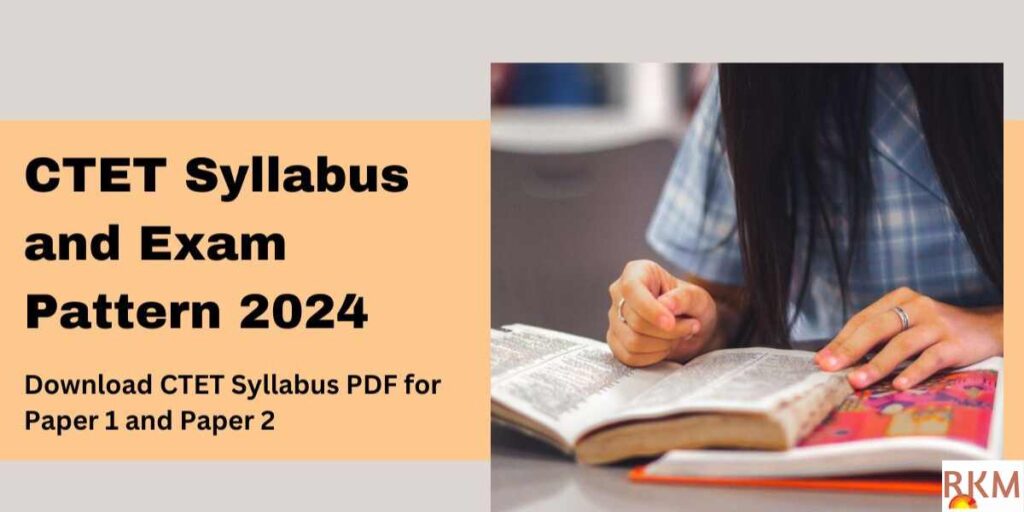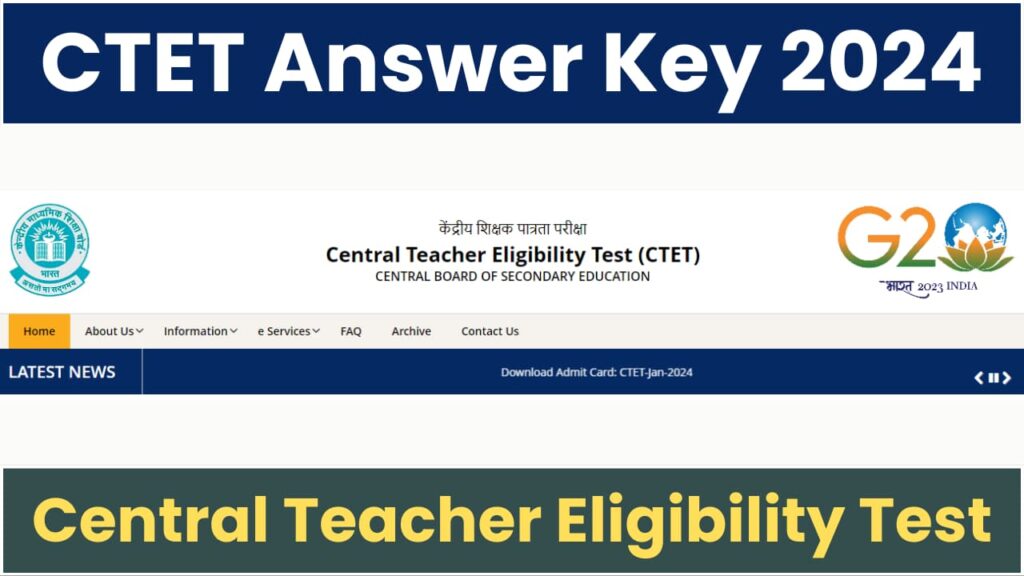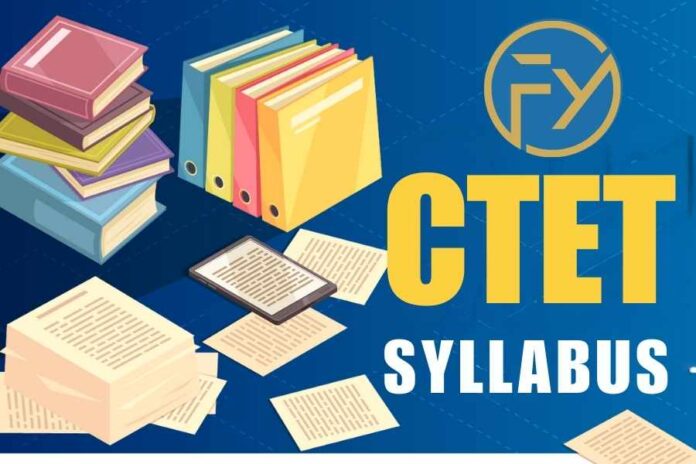The Central Teacher Eligibility Test (CTET) is a national-level exam conducted by the Central Board of Secondary Education (CBSE). CTET is conducted twice a year to determine the eligibility of candidates for appointment as teachers for Classes 1 to 8. The CTET exam involves two papers- Paper 1 and Paper 2.

Why c-tet need :
The main purpose or objective of undergoing a CTET examination is the minimum eligibility for a central government teaching job. It is additional support to the profile. After CTET certificates candidates can apply for all Central Government Teaching jobs like KVS, NVS Army Teacher, ERDO, etc.
It is the minimum requirement to become a teacher in Central Government schools. If the candidates have the CTET certificate they can apply for teaching jobs in KVs, NVs, ERDO, and National Army Schools. Many private schools in India also shortlist candidates on the basis of CTET scores.
Who are eligible :
Candidates who are Class 12 passed are eligible to apply for CTET Paper 1 and those who have completed graduation with a minimum of 50 per cent aggregate marks are eligible for Paper 2. Q. What is the minimum age limit to appear for the CTET 2024 exam? A. The minimum age limit to appear for the CTET exam is 18 years.
The CTET Paper 1 syllabus includes five sections- Child Development and Pedagogy, Language-I, Language-II, Mathematics and Environmental Studies and the CTET Paper 2 syllabus comprises four sections- Child Development and Pedagogy, Language-I, Language-II, Mathematics and Science or Social Studies/Social Sciences.
As per the minimum passing marks set by the officials, the CTET cut-off for the General category is 90 out of 150, which equates to a passing percentage of 60%. Candidates who score 90 or more will qualify for the further stages.
CTET Syllabus Highlights :
The CTET (Central Teacher Eligibility Test) syllabus is divided into two parts: Paper 1 and Paper 2, depending on the class level for which the candidate is applying to teach. Here’s a highlight of the CTET syllabus for both papers:

Paper 1 (Classes I-V): Primary Stage
This paper is for candidates aspiring to teach classes 1 to 5.
- Child Development and Pedagogy
- Child Development (Primary School Child)
- Concept of Inclusive Education and Understanding Children with Special Needs
- Learning and Pedagogy
- Language I (Compulsory)
- Language Comprehension
- Pedagogy of Language Development
- Language II (Compulsory)
- Comprehension
- Pedagogy of Language Development
- Mathematics
- Content: Numbers, Shapes & Geometry, Data Handling
- Pedagogical Issues
- Environmental Studies
- Content: Family, Food, Shelter, Water, Travel, Things We Make and Do
- Pedagogical Issues
Paper 2 (Classes VI-VIII): Elementary Stage
This paper is for candidates aiming to teach classes 6 to 8.
- Child Development and Pedagogy
- Child Development (Elementary School Child)
- Concept of Inclusive Education and Understanding Children with Special Needs
- Learning and Pedagogy
- Language I (Compulsory)
- Language Comprehension
- Pedagogy of Language Development
- Language II (Compulsory)
- Comprehension
- Pedagogy of Language Development
- Mathematics and Science (for Mathematics and Science Teachers)
- Content: Number System, Algebra, Geometry, Mensuration, Data Handling
- Pedagogical Issues in Mathematics
- Science: Food, Materials, The World of the Living, Natural Phenomena, Pedagogical Issues in Science
- Social Studies/Social Science (for Social Studies/Social Science Teachers)
- Content: History, Geography, Social and Political Life
- Pedagogical Issues in Social Studies
Main Features of the Syllabus
- Focus on child development and pedagogical understanding.
- Emphasis on inclusive education.
- Conceptual knowledge of the respective subjects with pedagogical insight.
Each paper consists of 150 multiple-choice questions (MCQs), each carrying 1 mark. There is no negative marking.
Exam Pattern :
- Total Marks: 150
- Total Questions: 150 MCQs
- Duration: 2 hours 30 minutes
- Sections:
- Child Development & Pedagogy: 30 questions (30 marks)
- Language I: 30 questions (30 marks)
- Language II: 30 questions (30 marks)
- Mathematics: 30 questions (30 marks)
- Environmental Studies: 30 questions (30 marks)
This syllabus ensures that candidates are well-prepared to address the needs of primary school children with a strong focus on pedagogy, child development, and the subjects they’ll teach.
CTET Paper 1 syllabus details :
The CTET Paper 1 syllabus is designed for candidates aspiring to teach classes I to V (Primary Stage). It focuses on the foundational knowledge required for teaching young children. Here’s a detailed breakdown of the CTET Paper 1 syllabus:
1. Child Development and Pedagogy (30 Marks)
- Child Development (Primary School Child): Concept of development and its relationship with learning, Principles of development of children, Influence of heredity and environment, Socialization processes, and Piaget, Kohlberg, and Vygotsky’s constructs and critical perspectives.
- Concept of Inclusive Education: Understanding children with special needs, addressing the needs of children with learning difficulties, and the significance of inclusive education.
- Learning and Pedagogy: How children think and learn, motivation and learning, factors contributing to learning, and the role of teachers in facilitating learning.
2. Language I (30 Marks)
- Language Comprehension: Reading unseen passages—both prose and poetry—with questions on comprehension, inference, grammar, and verbal ability.
- Pedagogy of Language Development: Learning and acquisition, the role of listening and speaking, language teaching principles, challenges in language teaching, and remedial teaching.
3. Language II (30 Marks)
- Comprehension: Reading unseen passages (prose, drama, or poetry) with questions on comprehension, grammar, and verbal ability.
- Pedagogy of Language Development: Learning and acquisition, role of listening and speaking, functions of language and how children use it as a tool, principles of second language teaching, and challenges of teaching language in a diverse classroom.
4. Mathematics (30 Marks)
- Content:
- Numbers: Addition, subtraction, multiplication, division, and the relationship between numbers.
- Shapes and Geometry: Basic geometrical ideas, shapes, symmetry, and spatial understanding.
- Data Handling: Reading and interpreting data.
- Measurement: Length, weight, time, volume, and money.
- Pedagogical Issues: Understanding children’s problem-solving strategies, error analysis, and creating a conducive learning environment.
5. Environmental Studies (30 Marks)
- Content:
- Family and Friends: Relationships, work and play, animals, plants.
- Food: Sources of food, components of food, cooking, and preservation.
- Shelter: Types of houses, materials used for making houses.
- Water: Sources, properties, conservation of water.
- Travel: Means of transport.
- Things We Make and Do: Materials used in daily life.
- Pedagogical Issues: Environmental studies and its relevance to daily life, concepts and methods of EVS teaching, developing critical thinking in children, and the significance of discussion in learning.
12 way to prepare CTET :
Preparing for the CTET (Central Teacher Eligibility Test) requires a well-structured plan, focusing on both subject knowledge and pedagogy. Here’s a step-by-step guide on how to prepare for CTET effectively:
1. Understand the Syllabus and Exam Pattern
- Familiarize Yourself with the Syllabus: Start by thoroughly going through the syllabus of Paper 1 (for Classes I-V) or Paper 2 (for Classes VI-VIII), depending on which one you are appearing for.
- Understand the Exam Pattern: Both Paper 1 and Paper 2 have 150 multiple-choice questions (MCQs), divided into five sections. Focus on understanding how marks are distributed and the time allotted for each section.
- Paper 1: (For Classes I-V) – Child Development & Pedagogy, Language I, Language II, Mathematics, Environmental Studies.
- Paper 2: (For Classes VI-VIII) – Child Development & Pedagogy, Language I, Language II, Mathematics/Science (for science teachers) or Social Studies (for social science teachers).
2. Create a Study Plan
- Daily Study Routine: Dedicate 4-5 hours daily to your preparation. Allocate specific time slots to each subject or topic.
- Weekly Targets: Set weekly goals to cover different portions of the syllabus. Review your progress at the end of each week.
- Prioritize Based on Strengths and Weaknesses: If you’re strong in a particular subject, spend less time on it and focus more on subjects where you’re weak.
3. Focus on Child Development and Pedagogy
- Key Area: This is a crucial section that appears in both papers (30 marks), emphasizing how children learn, different teaching methods, and educational psychology.
- Reference Books: Study books on educational psychology by authors like NCERT or K.S. Sudha Rani, and follow NCERT’s “Learning and Pedagogy” sections.
4. Strengthen Your Language Skills
- Language I & II: Choose languages you are most comfortable with. Focus on:
- Comprehension: Practice reading unseen passages and answering questions.
- Grammar & Vocabulary: Review basic grammar rules, sentence structure, and word usage.
- Pedagogy of Language Development: Understand how to teach languages and focus on child language development theories.
5. Practice Mathematics and Science (For Paper 2)
- Mathematics: Review fundamental concepts like numbers, geometry, algebra, and data handling. Solve problems and focus on the Pedagogical Issues related to teaching math to students.
- Science: Study concepts related to living organisms, materials, and natural phenomena. Focus on teaching methods and concept clarification in science.
6. Master Environmental Studies (For Paper 1)
- Focus on the basics of family, food, water, shelter, animals, plants, and EVS Pedagogy. Use NCERT books for primary classes as they cover the basics of EVS in an easy-to-understand way.
7. Prepare for Social Studies (For Paper 2)
- If appearing for Social Studies, go through subjects like History, Geography, Social and Political Life. Focus on important concepts and events, and understand the pedagogical methods for teaching social sciences.
8. Refer to Standard Study Material
- Use NCERT textbooks for classes 1 to 8 to cover basic concepts.
- For Child Development and Pedagogy, refer to books like:
- “CTET & TETs Child Development & Pedagogy” by Arihant
- “CTET Success Master Paper 1 & 2” by Arihant Experts
- For previous years’ papers and mock tests, refer to:
- “CTET Solved Papers and Practice Sets” by Upkar Prakashan
- “CTET Paper I & II Solved Papers” by Disha Publications
9. Practice with Previous Year Papers and Mock Tests
- Previous Year Papers: Solve at least 5-10 years’ worth of CTET question papers. This helps you understand the exam pattern, type of questions asked, and difficulty level.
- Mock Tests: Regularly attempt mock tests under timed conditions. Analyze your mistakes and revise accordingly.
- Speed and Accuracy: Since there’s no negative marking, practice attempting as many questions as possible accurately within the given time.
10. Revise Regularly
- Revision Notes: Prepare concise notes for quick revision of important topics like child development theories, math formulas, and EVS concepts.
- Weekly Revisions: Make sure to revise topics every week to retain the concepts you have studied.
11. Stay Updated with Educational Policies
- Read about the latest educational policies like the National Education Policy (NEP) 2020, and keep yourself informed about recent trends in education and teaching practices.
12. Stay Positive and Relax
- Consistency is Key: Stick to your study plan, but also give yourself time to relax.
- Stay Healthy: Ensure that you’re getting enough rest, eating well, and keeping stress levels low.
By combining a solid understanding of the syllabus, thorough study, and regular practice, you can be well-prepared for the CTET exam.
Selecting the Right Books:
- Focus on Standard Authors: Choose books by reputed publishers like Arihant, Disha, Pearson, and Wiley.
- Previous Year Papers: Always refer to solved papers for better understanding of exam trends and question types.
- NCERT Books: Since the CTET syllabus aligns with the NCERT curriculum, it’s important to refer to these books for subject knowledge, especially for EVS, Mathematics, and Science.
- Pedagogy Focus: Ensure the books you choose cover pedagogical methods extensively, as these are key areas in the exam.
Is the CTET exam difficult?
The CTET is an easy exam to crack if candidates have prepared well in advance. The difficulty level of the CTET question paper is generally moderate. The CTET exam difficulty level varies on the basis of the question paper. Candidates should be well prepared in order to crack the exam without any hassle.
Is CTET has negative marking?
The marking scheme is one of the most important things that is supposed to be remembered by the candidate while appearing for the CTET examination . There is no negative marking in the examination, candidates can use this factor to their advantage. Candidates should try to attempt all the questions.
How many attempts for CTET?
The CTET qualifying certificate for appointment is valid for a lifetime for all categories. There is no limit on the number of attempts a person can make to acquire a CTET certificate. A person who has qualified for the CTET exam may also appear again to improve their score.
What is a good score in CTET?
The CTET good score for the General category candidates is 90 out of 150 which amounts to 60% to pass. Candidates should ideally aim for a score of 90 or above to enhance their chances of securing a teaching job.
Is CTET valid for lifetime?
What is the validity of CTET result? Yes, CTET 2024 result will be valid for a lifetime. “The validity period of CTET qualifying certificate for appointment will be for life timefor all categories,” CBSE CTET information brochure said.

